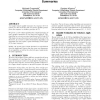206 search results - page 20 / 42 » Better Bounds for Online Scheduling |
IPPS
2000
IEEE
14 years 11 min ago
2000
IEEE
A self-stabilizing algorithm, regardless of the initial system state, converges in finite time to a set of states that satisfy a legitimacy predicate without the need for explici...
ICTCS
2005
Springer
14 years 1 months ago
2005
Springer
We study the effect of laxity, or slack time, on the online scheduling of broadcasts with deadlines. The laxity of a request is defined to be the ratio between its span (differe...
COLT
2008
Springer
13 years 9 months ago
2008
Springer
We design and analyze interacting online algorithms for multitask classification that perform better than independent learners whenever the tasks are related in a certain sense. W...
SIGMOD
2001
ACM
14 years 7 months ago
2001
ACM
An -appro ximate quantile summary of a sequence of N elements is a data structure that can answer quantile queries about the sequence to within a precision of N. We presen t a new...
CODES
2008
IEEE
14 years 2 months ago
2008
IEEE
To provide Quality of Service (QoS) guarantees in open and unpredictable environments, the utilization control problem is defined to keep the processor utilization at the schedula...

